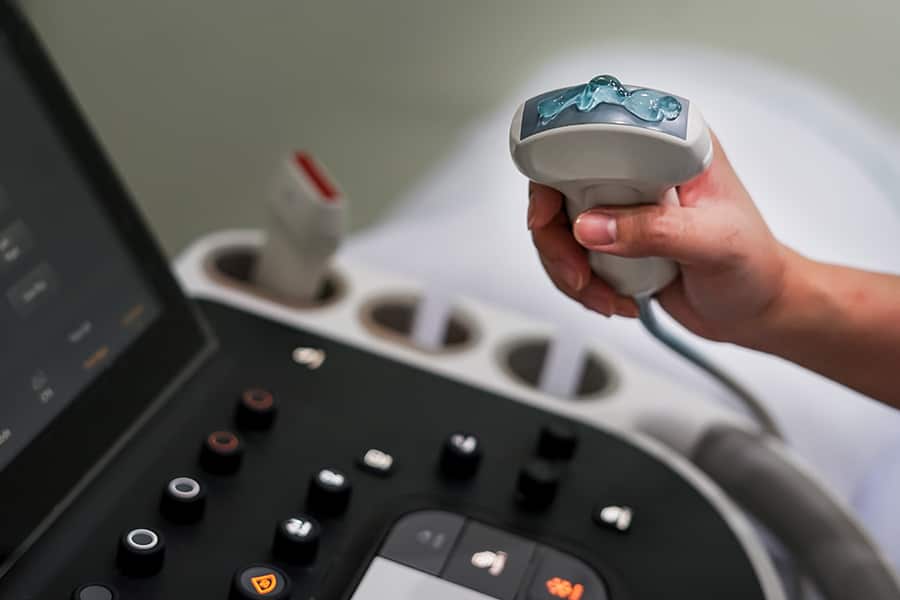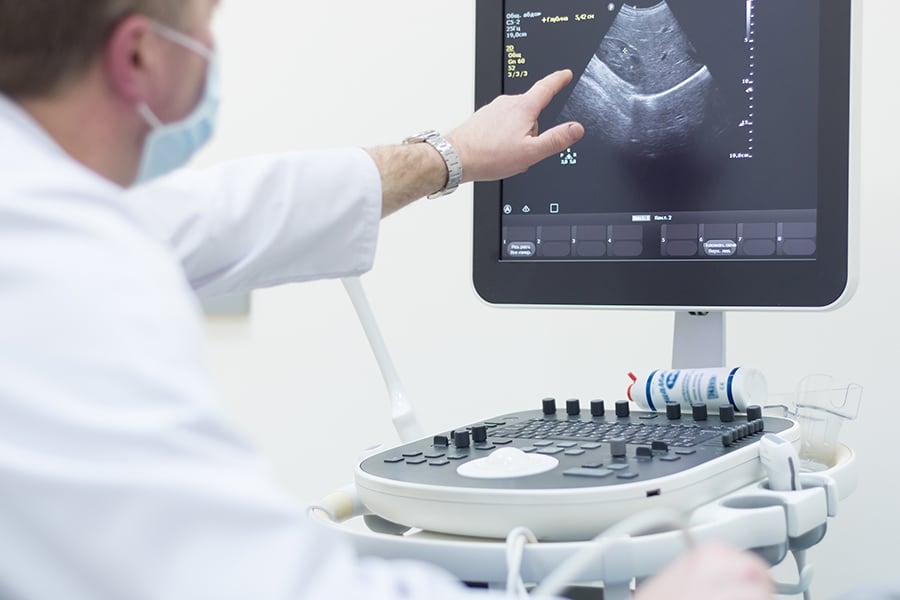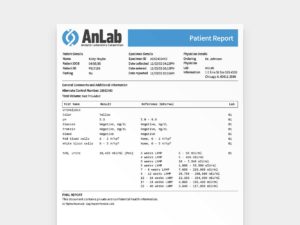
Anticipation and excitement are inevitable parts of pregnancy. As a parent, there is so much about your baby that you're looking forward to discovering. From the baby's features to gender, many parents are eager to know.
Luckily, scanning techniques such as ultrasound have advanced greatly, allowing you to take a look inside the womb and learn about your little one's well being. However, an ultrasound is much more just a medical test. It not only can make you feel nervous or excited but also cause a flood of emotions.
That is why it is important to know what to expect during a typical ultrasound appointment so that you can keep your nerves calm and enjoy it. Although your doctor usually performs the first ultrasound to confirm pregnancy, there is a lot more than the procedure can reveal in the later stages.
If you're expecting your first baby and the thought of having an ultrasound dreads you, here is everything you need to know.
A prenatal ultrasound is a scan that uses sound waves and creates a fetus's visual image, uterus, and placenta during pregnancy. It enables your gynecologist to accumulate valuable information on the progress of baby, pregnancy, and most importantly, the baby's health.
It is a relatively short process in which a technician or sonographer attached handheld equipment known as a transducer to a pregnant woman's uterus. The transducer sends sound waves that bounce off the Baby. A programmed instrument translates these echoing waves into visual images to reveal the baby's position, movement, and shape.

Medical practitioners use these ultrasound waves in handheld instrument "Doppler" during prenatal visits of expectant mothers to listen to the heartbeat of the baby.
You can expect your doctor to perform your first ultrasound during the first trimester to not only confirm pregnancy but also assess how far along you're. In many cases, doctors don't perform a standard mid-pregnancy sonogram until 18 to 22 weeks of pregnancy.
This is also when you can learn about the gender of your baby (if you want). You may have a grainy printout of the ultrasound as a keepsake.
Many doctors recommend keeping the sonogram safe as a part of your genetic tests, such as chorionic villus sampling, nuchal translucency test, and amniocentesis. They can help you determine the signs of any complications with the Baby.
Keep in mind that if you have any underlying medical condition such as hypertension and diabetes, your doctor might ask you to have an ultrasound frequently.
When scheduling your first appointment, ask your doctor if he/she will conduct an ultrasound. However, if you're six or ten weeks pregnant, you will likely have an ultrasound. Most medical professionals have an ultrasound instrument in their office.
An ultrasound technician puts some gel on a transducer (ultrasound device) during an ultrasound and moves it in a circular motion across the belly. The transducer sends off or releases electronic sound waves to help the fetus bounce off its fluids, tissues, and bones. These waves make a visual of the fetus in the womb. A video screen (attached to the transducer) shows all this process to parents.
Note that your ultrasound technician will ask you to undress from the waist and put your feet on stirrups. You might feel like you're undergoing a pelvic exam, but the position is important for the transducer to move easily and cover the whole belly. The technician also covers the transducer with lubricant and a broad condom-like sheath before putting it inside the vagina.
The process doesn't take longer than 10 to 15 minutes, and it is important to give your gynecologist crucial information about the growing baby in your womb. Also, it is completely safe and involves no risks. It is also useful for discovering early pregnancy problems such as cysts or other fetus developmental issues.

If you're having a mid-pregnancy sonogram, it allows your medical practitioner to:
During an ultrasound, your doctor measures and assesses the number of heartbeats per minute of your baby to ensure it is normal.
When it comes to measuring Baby's size, a sonographer can measure several things to make sure your baby is growing normally. He measures the skull size, thighbone, and abdomen to ensure that it is appropriate according to the baby's age.
If the Baby's size is smaller or bigger than two weeks during the first ultrasound, it means that your due date may extend. If your doctor concerns your baby's growth, he/she may recommend more follow-up sonograms.
Placenta's location is key information an ultrasound can provide to your doctor. If your placenta covers the Previa or cervix, it may cause bleeding in later stages of pregnancy. The condition requires more follow-up scans in the third trimester to check the position of the placenta.
However, there is no need to panic as only a small percentage of women facing this issue before 20 weeks of their pregnancy may have some complications.
Your doctor looks closely at your baby's basic anatomy that includes the size of the neck, heart, chest, kidneys, bladders, stomach, and arms. He/she also assesses the umbilical cord to ensure that it is developing properly.
If your first-trimester screening or multiple markers show suspicious results or anything causing concern, the sonographer does a thorough scan (level II). It helps him evaluate the signs of any congenital disability, such as Down syndrome.
All in all, an ultrasound is an important screening test and is an integral part of early parental medical assessment. It can reveal a lot about your pregnancy. Thus, the given details are helpful to understand the procedure better so that you can enjoy peeking at your baby's first glance.
If you have any questions, concerns, apprehensions, unease, or worry about your fetus’ development contact your health care provider immediately.








ALL WARRANTIES OF ANY KIND WHATSOEVER EXPRESS, IMPLIED, AND STATUTORY, ARE HEREBY DISCLAIMED. ALL IMPLIED WARRANTIES OF MERCHANTABILITY AND FITNESS FOR A PARTICULAR PURPOSE ARE HEREBY DISCLAIMED. THE PRODUCTS SOLD, INCLUDING SONOGRAMS, ULTRASOUNDS, FAKE PREGNANCY DOCUMENTS, AND FAKE PREGNANCY TESTS ARE SOLD ‘AS IS’ BASIS.
THE SITE CANNOT AND DOES NOT CONTAIN [MEDICAL/ LEGAL/ FITNESS/ HEALTH/ OTHER] ADVICE. THE INFORMATION IS PROVIDED FOR PRANKS PURPOSES ONLY AND IS NOT A SUBSTITUTE FOR PROFESSIONAL ADVICE.
ACCORDINGLY, BEFORE TAKING ANY ACTIONS BASED UPON SUCH INFORMATION, WE ENCOURAGE YOU TO CONSULT WITH THE APPROPRIATE PROFESSIONALS. WE DO NOT PROVIDE ANY KIND OF MEDICAL/ LEGAL/ FITNESS/ HEALTH ADVICE. THE USE OR RELIANCE OF ANY INFORMATION CONTAINED ON THIS SITE, OR OUR MOBILE APPLICATION, IS SOLELY AT YOUR OWN RISK.
THIS WEBSITE DOES NOT PROVIDE MEDICAL ADVICE. THE INFORMATION, INCLUDING BUT NOT LIMITED TO, TEXT, GRAPHICS, IMAGES AND OTHER MATERIAL CONTAINED ON THIS WEBSITE ARE FOR PRANK PURPOSES ONLY. NO MATERIAL ON THIS SITE IS INTENDED TO BE A SUBSTITUTE FOR PROFESSIONAL MEDICAL ADVICE, DIAGNOSIS OR TREATMENT. ALWAYS SEEK THE ADVICE OF YOUR PHYSICIAN OR OTHER QUALIFIED HEALTH CARE PROVIDER WITH ANY QUESTIONS YOU MAY HAVE REGARDING A MEDICAL CONDITION OR TREATMENT AND BEFORE UNDERTAKING NEW HEALTH CARE REGIMEN, AND NEVER DISREGARD PROFESSIONAL MEDICAL ADVICE OR DELAY IN SEEKING IT BECAUSE OF SOMETHING YOU HAVE READ ON THIS WEBSITE.
THE PARTIES AGREE THAT ANY PRODUCT PURCHASED ON THE BABY MAYBE WEBSITE SHALL NOT BE USED FOR ANY PROPOSE OTHER THAN AS A PRANK. WITHOUT EXCEPTION NO BABY MAYBE PRODUCT SHALL BE PROVIDED/SUBMITTED TO ANY GOVERNMENTAL OR OTHER AGENCY, MEDICAL DOCTOR, ARBITER OF A DISPUTE, AS PROOF OF PREGNANCY, PAST OR CURRENT, OR TO CLAIM ANY BENEFIT FOR WHICH A PREGNANT WOMAN MAY BE ELIGIBLE, OR ENTITLED TO RECEIVE, BASED ON HER BEING PREGNANT. NO HIPAA PROTECTED PATIENT HEALTH INFORMATION CONNECTED TO ANY BABY MAYBE PRODUCT, IS INTENDED, OR CONVEYED, WITH RESPECT TO THIS SALE.
THE PARTIES AGREE THAT BABYMAYBE IS NOT RESPONSIBLE FOR ANY LIABILITY WHATSOEVER FOR DELAYS IN SHIPPING THE PRODUCT. THE PARTIES FURTHER AGREE THAT THE SOLE REMEDY FOR ANY SHIPPING DELAYS IS THE REFUND OF THE PURCHASER’S PAYMENT FOR THE PRODUCT.
THE PARTIES AGREE THAT THE FORUM FOR ANY LEGAL ACTION ASSOCIATED WITH THE SALE AND PURCHASE OF THE PRODUCT IS THE STATE OF ILLINOIS.